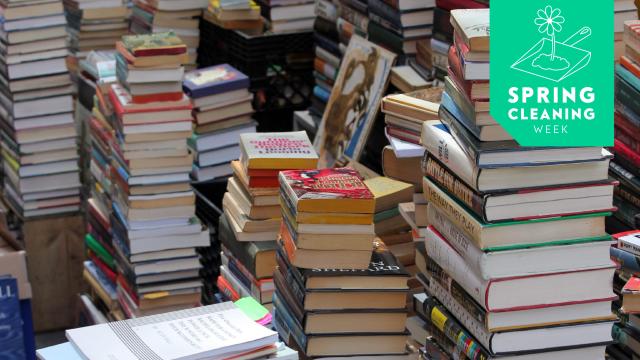“So many books, so little time” might be an eye-rolling slogan slightly worse than “Keep calm and carry on,” but it’s also literally true. As is “so many books, so little space.” When you have too many books, how do you decide which ones to get rid of? We asked authors, publishers, and booksellers (all notorious book hoarders) how they keep control of their home libraries.
Maya Ziv, editor at Penguin Random House, has learned that some books outlive their usefulness:
If I have already read the book, then I keep the ones I know I will want to either reread or keep on my shelf for years. But then there are the books that I have moved to several apartments and can just tell I have lost interest in, or have moved past a phase (paranormal YA, for example!), and those I part with.
Jamia Wilson, executive director of the Feminist Press (profiled in Lifehacker’s How I Work), recommends dropping books off at a local little free library:
As a part of spring cleaning, I take an inventory of what books I still need to read, or still feel that I’m learning from and/or keep returning to. I keep those books, plus books that were given to me as gifts or signed personally, and donate the rest to friends who would benefit from them or to local charities. We also have a community library (an open bookshelf) in my neighbourhood that I often populate with books when I feel the need to create space.
Justin Taylor, author of Flings and The Gospel of Anarchy, draws a distinction between good books and rare books:
Two or three times a year my wife and I go through our book collection together to review what’s actually there and how we feel about it. We don’t do a lot of campaigning for or against things, because the bias is toward keeping the collection robust and wide-ranging (prune not purge) so if one person wants to keep something and the other doesn’t, or if both of us are basically neutral, the book stays. We get rid of anything that we didn’t like, or that we did not ask for but was sent to us, or that we liked just-ok but have no intention of ever reading again.
I find the hardest calls to make are on those books that you have not yet read, but plan (or, worse yet, hope) to read at some point in the future. Some of this of course is just aspirational self-delusion, but not all of it. For example: I’ve had in my possession for many years Gershom Scholem’s biography of the mystical Jewish heretic/cult-leader/messiah Sabbatai Sevi. This is a book that is not easy to come by, that I went out of my way to acquire, and that I will definitely read — sooner or later — so I feel fully justified in having moved it to no less than three apartments and across the country in order to keep my option on it open.
On the other hand, I voted to get rid of our copy of In Search of Lost Time despite having a similar feeling of sooner or later about it. The difference is that our copy of that book was a cheap paperback that I don’t know where it came from and which I could easily replace if I ever wanted to. So it went to Powell’s.
If/when the day comes that I’m finally ready to take on Proust, I’ll go down there and they will have a bunch of editions and I’ll pick one and that will be that. Maybe they will even have my copy and I’ll buy it back used.
Some of our sources were reluctant to talk about getting rid of books. (Most book people we know are maximalists.) If you’re looking for validation of your towering stacks, here’s some from Emma Straub, author of The Vacationers and owner of indie bookstore Books Are Magic:
If by “winnowing,” you mean, very rarely stepping in to avoid a Collyer Brothers-type situation, yes, every few years I go through my shelves and get rid of galleys and other books that I think I will never open. I really hate getting rid of books, though, so the answer is almost always to put up more shelves. And when necessary, move.
Personally, we (who are married to a publishing professional who’s claimed about 80 per cent of our bookshelf), have found a couple of methods. First, to quickly decide which unread books to ditch: Read the first page and one other random page. If you find yourself accidentally reading more, it’s a keeper; otherwise, ditch it.
Or — our second trick — it can go into a probation pile. You’re probably going to donate or sell most of your old books (but not to the library), so just keep that giveaway pile in the closet for a week or two. Before you cart it out of the house, you get one more chance to paw through the books and stick some back on the shelf. (If this is too much freedom, limit yourself to two take-backs.)
But in general, the consensus from our sources is that it feels good to keep books. So let that good feeling — or the lack thereof — be your guide.

Comments